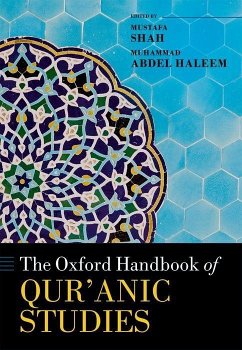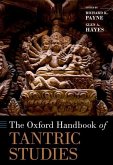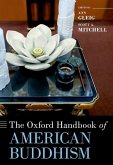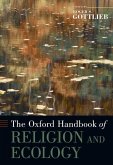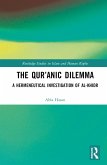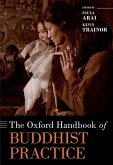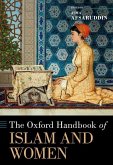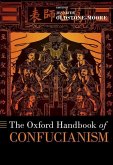The Oxford Handbook of Qur'anic Studies
Herausgeber: Shah, Mustafa; Haleem, M A S Abdel
The Oxford Handbook of Qur'anic Studies
Herausgeber: Shah, Mustafa; Haleem, M A S Abdel
- Gebundenes Buch
- Merkliste
- Auf die Merkliste
- Bewerten Bewerten
- Teilen
- Produkt teilen
- Produkterinnerung
- Produkterinnerung
The Handbook considers the State of Qur'anic Studies; Historical Setting; Textual Transmission and Codification; Structural and Literary Features; Content and Concepts; Applied Discourses; and an Overview of Qur'anic Interpretation.
Andere Kunden interessierten sich auch für
![The Oxford Handbook of Tantric Studies The Oxford Handbook of Tantric Studies]() Oxford HandbooksThe Oxford Handbook of Tantric Studies282,99 €
Oxford HandbooksThe Oxford Handbook of Tantric Studies282,99 €![The Oxford Handbook of American Buddhism The Oxford Handbook of American Buddhism]() The Oxford Handbook of American Buddhism211,99 €
The Oxford Handbook of American Buddhism211,99 €![The Oxford Handbook of Religion and Ecology The Oxford Handbook of Religion and Ecology]() Roger S. Gottlieb (ed.)The Oxford Handbook of Religion and Ecology244,99 €
Roger S. Gottlieb (ed.)The Oxford Handbook of Religion and Ecology244,99 €![The Qur'anic Dilemma The Qur'anic Dilemma]() Abla HasanThe Qur'anic Dilemma180,99 €
Abla HasanThe Qur'anic Dilemma180,99 €![The Oxford Handbook of Buddhist Practice The Oxford Handbook of Buddhist Practice]() Kevin TrainorThe Oxford Handbook of Buddhist Practice226,99 €
Kevin TrainorThe Oxford Handbook of Buddhist Practice226,99 €![The Oxford Handbook of Islam and Women The Oxford Handbook of Islam and Women]() The Oxford Handbook of Islam and Women211,99 €
The Oxford Handbook of Islam and Women211,99 €![The Oxford Handbook of Confucianism The Oxford Handbook of Confucianism]() Jennifer Oldstone-MooreThe Oxford Handbook of Confucianism230,99 €
Jennifer Oldstone-MooreThe Oxford Handbook of Confucianism230,99 €-
-
-
The Handbook considers the State of Qur'anic Studies; Historical Setting; Textual Transmission and Codification; Structural and Literary Features; Content and Concepts; Applied Discourses; and an Overview of Qur'anic Interpretation.
Hinweis: Dieser Artikel kann nur an eine deutsche Lieferadresse ausgeliefert werden.
Hinweis: Dieser Artikel kann nur an eine deutsche Lieferadresse ausgeliefert werden.
Produktdetails
- Produktdetails
- Verlag: Oxford University Press
- Seitenzahl: 938
- Erscheinungstermin: 14. Juli 2020
- Englisch
- Abmessung: 252mm x 180mm x 57mm
- Gewicht: 1805g
- ISBN-13: 9780199698646
- ISBN-10: 0199698643
- Artikelnr.: 57149935
- Herstellerkennzeichnung
- Libri GmbH
- Europaallee 1
- 36244 Bad Hersfeld
- gpsr@libri.de
- Verlag: Oxford University Press
- Seitenzahl: 938
- Erscheinungstermin: 14. Juli 2020
- Englisch
- Abmessung: 252mm x 180mm x 57mm
- Gewicht: 1805g
- ISBN-13: 9780199698646
- ISBN-10: 0199698643
- Artikelnr.: 57149935
- Herstellerkennzeichnung
- Libri GmbH
- Europaallee 1
- 36244 Bad Hersfeld
- gpsr@libri.de
Mustafa Shahis a Senior Lecturer in Islamic Studies at the School of Oriental and African Studies, where he completed his BA and PhD degrees. He research interests and teaching cover early Islamic literature, Arabic linguistic thought, classical exegesis, theologyand hadith studies. He has edited two major collections on the hadith and Quranic exegesis: The Hadith: Critical Concepts in Islamic Studies, Routledge, (2009), and Tafsir: Interpreting the Qur'an. Critical Concepts in Islamic Studies, Routledge, (2013).He is also editing TheOxford Handbook of Hadith Studies. M.A.S. Abdel Haleem was born in Egypt and educated at al-Azhar, Cairo, and Cambridge Universities. He taught Arabic at Cambridge University and has been teaching Arabic and Islamic Studies in London University for many years. He is currently Professor of Islamic Studies and Director of the Centre of Islamic Studies at the School of Oriental and African Studies, University of London. He is editor of the Journal of Qur'anic Studies and the London Qur'an Studies Series. Among his published works are The Quran: A New Translation, Oxford: Oxford University Press, (2004); and The Qur'an: English translation with parallel Arabic text, Oxford University Press (2010); Understanding the Qur'an: themes and style. London: I B Tauris (1999); with Elsaid Badawi An Arabic-English Dictionary of Qur'anic Usage, Brill (2007). His latest work is entitled: Exploring the Qur'an: Images and Reality, I.B. Tauris (2017).
* List of Illustrations * List of contributors * Introduction * Part I: The State of Qur'anic Studies * 1: Andrew Rippin: Academic Scholarship and the Qur'an * 2: Oliver Leaman: Modern Developments in Qur'anic Studies * 3: Herbert Berg: Islamic Origins and the Qur'an * 4: Anna Akasoy: Qur'anic Studies: Bibliographical Survey * Part II: The Historical Setting of the Qur'an * 5: Muntasir F. al-Hamad and John F. Healey: Late Antique Near Eastern Context: Social and Religious Aspects * 6: Harry Munt: Arabian Context of the Qur'an: History and the Text * 7: Ahmad Al-Jallad: The Linguistic Landscape of pre-Islamic Arabia: Context for the Qur'an * 8: Marianna Klar: Qur'anic Exempla and Late Antique Narratives * 9: Reuven Firestone: The Qur'an and Judaism * 10: Neal Robinson: The Qur'an and Christianity * Part III: The Qur'an: Textual Transmission, Codification, Manuscripts, Inscriptions and Printed Editions * 11: François Déroche: The Manuscript and Archaeological Traditions: Physical Evidence * 12: Yasin Dutton: The Form of the Qur'an: Historical Contours * 13: Mustafa Shah: The Corpus of Qur'anic Readings (qir
'
t): History, Synthesis and Authentication * 14: Sheila S. Blair: Glorifying God's Word: Manuscripts of the Qur'an * 15: Sheila S. Blair: Inscribing God's Word: Qur'anic texts on Architecture, Objects, and Other Solid Supports * 16: Efim A. Rezvan: A History of Printed Editions of the Qur'an * Part IV: Structural and Literary Dimensions of the Qur'an * 17: A. H. Mathias Zahniser: Language of the Qur'an * 18: Mustafa Shah: Vocabulary of the Qur'an: Meaning in Context * 19: Michel Cuypers: Qur'anic Syntax * 20: Muhammad Abdel Haleem: Rhetorical Devices and Stylistic Features of Qur'anic Grammar * 21: Nicolai Sinai: Inner-Qur'anic Chronology * 22: Mustansir Mir: The Structure of the Qur'an: The Inner Dynamic of the S
ra * 23: Ayman A. El-Desouky: Discussions of Qur'anic Inimitability: The Theological Nexus * 24: Geert Jan van Gelder: The Qur'an and the Arabic Medieval Literary Tradition * 25: Stefan Sperl: The Qur'an and Arabic Poetry * Part V: Topics and Themes of the Qur'an * 26: Ulrika M:artensson: Revelation and Prophecy in the Qur'an * 27: Stephen Burge: Doctrine and Dogma in the Qur'an * 28: Joseph Lowry: Law and the Qur'an * 29: Ebrahim Moosa: Qur'anic Ethics * 30: Sebastian Günther: Eschatology and the Qur'an * 31: Anthony H. Johns: Prophets and Personalities of the Qur'an * 32: Stefan Wild: Politics and the Qur'an * 33: Asma Afsaruddin: Jihad and the Qur'an: Classical and Modern Interpretations * 34: Asma Afsaruddin: Women and the Qur'an * Part VI: The Qur an in Context: Translation and Culture * 35: Translations of the Quraan: Western Languages * 36: M. Brett Wilson: Translations of the Qur an: Islamicate Languages * 37: Muhammad Abdel Haleem: Presenting the Qur'an Out of Context * 38: Bruce Lawrence: Popular Culture and the Qur an: Classical and Modern Contexts * 39: Jeffrey Einboden: The Western Literary Tradition and the Qur an: an Overview * Part VII: Qur anic Interpretation: Scholarship and Literature of Early, Classical, and Modern Exegesis * 40: Andrew Rippin: Early Qur'anic Commentaries * 41: Maher Jarrar: Exegetical Designs of the Sira: Tafsir and Sira * 42: Kees Versteegh: Early Qur'anic Exegesis: From Textual Interpretation to Linguistic Analysis * 43: Ulrika M:artensson: Early medieval tafs
r (800-1000) * 44: Walid A. Saleh: Medieval Exegesis: The Golden Age of Tafs
r * 45: Roberto Tottoli: The Corpora of Isr
äliyy
t * 46: Walid A. Saleh: Contemporary Tafs
r: The Rise of Scriptural Theology * Part VIII: Qur anic Exegesis: Discourses, Formats, and Hermeneutics * 47: Sajjad Rizvi: Twelver Shiai Exegesis * 48: Ismail Poonawala: Ism
äl
Scholarship on Tafs
r * 49: Valerie J. Hoffman and Sulaiman bin Ali bin Ameir Al-Shueili: Ib
Tafs
r Literature * 50: Alexander Knysh: Sufi Commentary: Formative and Later Periods * 51: Tariq Jaffer: Theological Commentaries * 52: Jules Janssens: Philosophical Commentaries * 53: Kamal Abu-Deeb: Aesthetically Oriented Interpretations of the Qur an * 54: Robert Morrison: Tafs
r and Science * 55: Johanna Pink: Classical Qur anic Hermeneutics * 56: Martin Nguyen: Sunni Hermeneutical Literature * 57: Massimo Campinini: Modern Qur'anic Hermeneutics: Strategies and Development
'
t): History, Synthesis and Authentication * 14: Sheila S. Blair: Glorifying God's Word: Manuscripts of the Qur'an * 15: Sheila S. Blair: Inscribing God's Word: Qur'anic texts on Architecture, Objects, and Other Solid Supports * 16: Efim A. Rezvan: A History of Printed Editions of the Qur'an * Part IV: Structural and Literary Dimensions of the Qur'an * 17: A. H. Mathias Zahniser: Language of the Qur'an * 18: Mustafa Shah: Vocabulary of the Qur'an: Meaning in Context * 19: Michel Cuypers: Qur'anic Syntax * 20: Muhammad Abdel Haleem: Rhetorical Devices and Stylistic Features of Qur'anic Grammar * 21: Nicolai Sinai: Inner-Qur'anic Chronology * 22: Mustansir Mir: The Structure of the Qur'an: The Inner Dynamic of the S
ra * 23: Ayman A. El-Desouky: Discussions of Qur'anic Inimitability: The Theological Nexus * 24: Geert Jan van Gelder: The Qur'an and the Arabic Medieval Literary Tradition * 25: Stefan Sperl: The Qur'an and Arabic Poetry * Part V: Topics and Themes of the Qur'an * 26: Ulrika M:artensson: Revelation and Prophecy in the Qur'an * 27: Stephen Burge: Doctrine and Dogma in the Qur'an * 28: Joseph Lowry: Law and the Qur'an * 29: Ebrahim Moosa: Qur'anic Ethics * 30: Sebastian Günther: Eschatology and the Qur'an * 31: Anthony H. Johns: Prophets and Personalities of the Qur'an * 32: Stefan Wild: Politics and the Qur'an * 33: Asma Afsaruddin: Jihad and the Qur'an: Classical and Modern Interpretations * 34: Asma Afsaruddin: Women and the Qur'an * Part VI: The Qur an in Context: Translation and Culture * 35: Translations of the Quraan: Western Languages * 36: M. Brett Wilson: Translations of the Qur an: Islamicate Languages * 37: Muhammad Abdel Haleem: Presenting the Qur'an Out of Context * 38: Bruce Lawrence: Popular Culture and the Qur an: Classical and Modern Contexts * 39: Jeffrey Einboden: The Western Literary Tradition and the Qur an: an Overview * Part VII: Qur anic Interpretation: Scholarship and Literature of Early, Classical, and Modern Exegesis * 40: Andrew Rippin: Early Qur'anic Commentaries * 41: Maher Jarrar: Exegetical Designs of the Sira: Tafsir and Sira * 42: Kees Versteegh: Early Qur'anic Exegesis: From Textual Interpretation to Linguistic Analysis * 43: Ulrika M:artensson: Early medieval tafs
r (800-1000) * 44: Walid A. Saleh: Medieval Exegesis: The Golden Age of Tafs
r * 45: Roberto Tottoli: The Corpora of Isr
äliyy
t * 46: Walid A. Saleh: Contemporary Tafs
r: The Rise of Scriptural Theology * Part VIII: Qur anic Exegesis: Discourses, Formats, and Hermeneutics * 47: Sajjad Rizvi: Twelver Shiai Exegesis * 48: Ismail Poonawala: Ism
äl
Scholarship on Tafs
r * 49: Valerie J. Hoffman and Sulaiman bin Ali bin Ameir Al-Shueili: Ib
Tafs
r Literature * 50: Alexander Knysh: Sufi Commentary: Formative and Later Periods * 51: Tariq Jaffer: Theological Commentaries * 52: Jules Janssens: Philosophical Commentaries * 53: Kamal Abu-Deeb: Aesthetically Oriented Interpretations of the Qur an * 54: Robert Morrison: Tafs
r and Science * 55: Johanna Pink: Classical Qur anic Hermeneutics * 56: Martin Nguyen: Sunni Hermeneutical Literature * 57: Massimo Campinini: Modern Qur'anic Hermeneutics: Strategies and Development
* List of Illustrations * List of contributors * Introduction * Part I: The State of Qur'anic Studies * 1: Andrew Rippin: Academic Scholarship and the Qur'an * 2: Oliver Leaman: Modern Developments in Qur'anic Studies * 3: Herbert Berg: Islamic Origins and the Qur'an * 4: Anna Akasoy: Qur'anic Studies: Bibliographical Survey * Part II: The Historical Setting of the Qur'an * 5: Muntasir F. al-Hamad and John F. Healey: Late Antique Near Eastern Context: Social and Religious Aspects * 6: Harry Munt: Arabian Context of the Qur'an: History and the Text * 7: Ahmad Al-Jallad: The Linguistic Landscape of pre-Islamic Arabia: Context for the Qur'an * 8: Marianna Klar: Qur'anic Exempla and Late Antique Narratives * 9: Reuven Firestone: The Qur'an and Judaism * 10: Neal Robinson: The Qur'an and Christianity * Part III: The Qur'an: Textual Transmission, Codification, Manuscripts, Inscriptions and Printed Editions * 11: François Déroche: The Manuscript and Archaeological Traditions: Physical Evidence * 12: Yasin Dutton: The Form of the Qur'an: Historical Contours * 13: Mustafa Shah: The Corpus of Qur'anic Readings (qir
'
t): History, Synthesis and Authentication * 14: Sheila S. Blair: Glorifying God's Word: Manuscripts of the Qur'an * 15: Sheila S. Blair: Inscribing God's Word: Qur'anic texts on Architecture, Objects, and Other Solid Supports * 16: Efim A. Rezvan: A History of Printed Editions of the Qur'an * Part IV: Structural and Literary Dimensions of the Qur'an * 17: A. H. Mathias Zahniser: Language of the Qur'an * 18: Mustafa Shah: Vocabulary of the Qur'an: Meaning in Context * 19: Michel Cuypers: Qur'anic Syntax * 20: Muhammad Abdel Haleem: Rhetorical Devices and Stylistic Features of Qur'anic Grammar * 21: Nicolai Sinai: Inner-Qur'anic Chronology * 22: Mustansir Mir: The Structure of the Qur'an: The Inner Dynamic of the S
ra * 23: Ayman A. El-Desouky: Discussions of Qur'anic Inimitability: The Theological Nexus * 24: Geert Jan van Gelder: The Qur'an and the Arabic Medieval Literary Tradition * 25: Stefan Sperl: The Qur'an and Arabic Poetry * Part V: Topics and Themes of the Qur'an * 26: Ulrika M:artensson: Revelation and Prophecy in the Qur'an * 27: Stephen Burge: Doctrine and Dogma in the Qur'an * 28: Joseph Lowry: Law and the Qur'an * 29: Ebrahim Moosa: Qur'anic Ethics * 30: Sebastian Günther: Eschatology and the Qur'an * 31: Anthony H. Johns: Prophets and Personalities of the Qur'an * 32: Stefan Wild: Politics and the Qur'an * 33: Asma Afsaruddin: Jihad and the Qur'an: Classical and Modern Interpretations * 34: Asma Afsaruddin: Women and the Qur'an * Part VI: The Qur an in Context: Translation and Culture * 35: Translations of the Quraan: Western Languages * 36: M. Brett Wilson: Translations of the Qur an: Islamicate Languages * 37: Muhammad Abdel Haleem: Presenting the Qur'an Out of Context * 38: Bruce Lawrence: Popular Culture and the Qur an: Classical and Modern Contexts * 39: Jeffrey Einboden: The Western Literary Tradition and the Qur an: an Overview * Part VII: Qur anic Interpretation: Scholarship and Literature of Early, Classical, and Modern Exegesis * 40: Andrew Rippin: Early Qur'anic Commentaries * 41: Maher Jarrar: Exegetical Designs of the Sira: Tafsir and Sira * 42: Kees Versteegh: Early Qur'anic Exegesis: From Textual Interpretation to Linguistic Analysis * 43: Ulrika M:artensson: Early medieval tafs
r (800-1000) * 44: Walid A. Saleh: Medieval Exegesis: The Golden Age of Tafs
r * 45: Roberto Tottoli: The Corpora of Isr
äliyy
t * 46: Walid A. Saleh: Contemporary Tafs
r: The Rise of Scriptural Theology * Part VIII: Qur anic Exegesis: Discourses, Formats, and Hermeneutics * 47: Sajjad Rizvi: Twelver Shiai Exegesis * 48: Ismail Poonawala: Ism
äl
Scholarship on Tafs
r * 49: Valerie J. Hoffman and Sulaiman bin Ali bin Ameir Al-Shueili: Ib
Tafs
r Literature * 50: Alexander Knysh: Sufi Commentary: Formative and Later Periods * 51: Tariq Jaffer: Theological Commentaries * 52: Jules Janssens: Philosophical Commentaries * 53: Kamal Abu-Deeb: Aesthetically Oriented Interpretations of the Qur an * 54: Robert Morrison: Tafs
r and Science * 55: Johanna Pink: Classical Qur anic Hermeneutics * 56: Martin Nguyen: Sunni Hermeneutical Literature * 57: Massimo Campinini: Modern Qur'anic Hermeneutics: Strategies and Development
'
t): History, Synthesis and Authentication * 14: Sheila S. Blair: Glorifying God's Word: Manuscripts of the Qur'an * 15: Sheila S. Blair: Inscribing God's Word: Qur'anic texts on Architecture, Objects, and Other Solid Supports * 16: Efim A. Rezvan: A History of Printed Editions of the Qur'an * Part IV: Structural and Literary Dimensions of the Qur'an * 17: A. H. Mathias Zahniser: Language of the Qur'an * 18: Mustafa Shah: Vocabulary of the Qur'an: Meaning in Context * 19: Michel Cuypers: Qur'anic Syntax * 20: Muhammad Abdel Haleem: Rhetorical Devices and Stylistic Features of Qur'anic Grammar * 21: Nicolai Sinai: Inner-Qur'anic Chronology * 22: Mustansir Mir: The Structure of the Qur'an: The Inner Dynamic of the S
ra * 23: Ayman A. El-Desouky: Discussions of Qur'anic Inimitability: The Theological Nexus * 24: Geert Jan van Gelder: The Qur'an and the Arabic Medieval Literary Tradition * 25: Stefan Sperl: The Qur'an and Arabic Poetry * Part V: Topics and Themes of the Qur'an * 26: Ulrika M:artensson: Revelation and Prophecy in the Qur'an * 27: Stephen Burge: Doctrine and Dogma in the Qur'an * 28: Joseph Lowry: Law and the Qur'an * 29: Ebrahim Moosa: Qur'anic Ethics * 30: Sebastian Günther: Eschatology and the Qur'an * 31: Anthony H. Johns: Prophets and Personalities of the Qur'an * 32: Stefan Wild: Politics and the Qur'an * 33: Asma Afsaruddin: Jihad and the Qur'an: Classical and Modern Interpretations * 34: Asma Afsaruddin: Women and the Qur'an * Part VI: The Qur an in Context: Translation and Culture * 35: Translations of the Quraan: Western Languages * 36: M. Brett Wilson: Translations of the Qur an: Islamicate Languages * 37: Muhammad Abdel Haleem: Presenting the Qur'an Out of Context * 38: Bruce Lawrence: Popular Culture and the Qur an: Classical and Modern Contexts * 39: Jeffrey Einboden: The Western Literary Tradition and the Qur an: an Overview * Part VII: Qur anic Interpretation: Scholarship and Literature of Early, Classical, and Modern Exegesis * 40: Andrew Rippin: Early Qur'anic Commentaries * 41: Maher Jarrar: Exegetical Designs of the Sira: Tafsir and Sira * 42: Kees Versteegh: Early Qur'anic Exegesis: From Textual Interpretation to Linguistic Analysis * 43: Ulrika M:artensson: Early medieval tafs
r (800-1000) * 44: Walid A. Saleh: Medieval Exegesis: The Golden Age of Tafs
r * 45: Roberto Tottoli: The Corpora of Isr
äliyy
t * 46: Walid A. Saleh: Contemporary Tafs
r: The Rise of Scriptural Theology * Part VIII: Qur anic Exegesis: Discourses, Formats, and Hermeneutics * 47: Sajjad Rizvi: Twelver Shiai Exegesis * 48: Ismail Poonawala: Ism
äl
Scholarship on Tafs
r * 49: Valerie J. Hoffman and Sulaiman bin Ali bin Ameir Al-Shueili: Ib
Tafs
r Literature * 50: Alexander Knysh: Sufi Commentary: Formative and Later Periods * 51: Tariq Jaffer: Theological Commentaries * 52: Jules Janssens: Philosophical Commentaries * 53: Kamal Abu-Deeb: Aesthetically Oriented Interpretations of the Qur an * 54: Robert Morrison: Tafs
r and Science * 55: Johanna Pink: Classical Qur anic Hermeneutics * 56: Martin Nguyen: Sunni Hermeneutical Literature * 57: Massimo Campinini: Modern Qur'anic Hermeneutics: Strategies and Development

